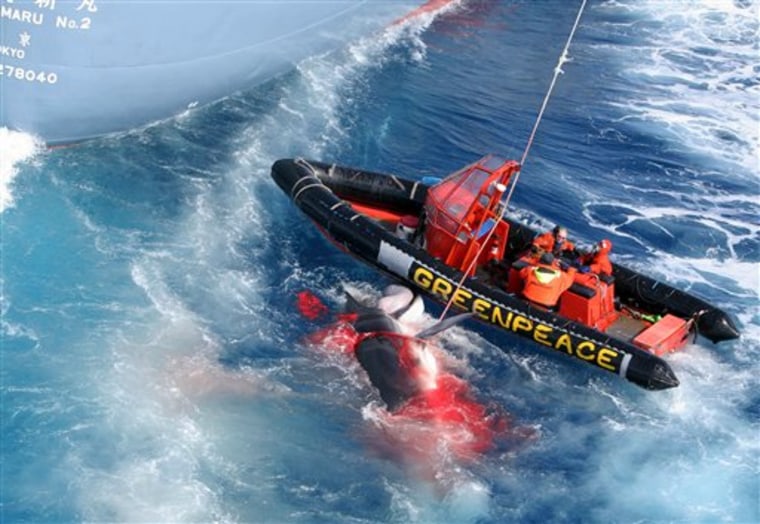Australia urged Japanese whalers and Greenpeace to calm down on Monday following life-threatening confrontations between them in the icy Southern Ocean. In the latest incident, a harpoon fired at a minke whale narrowly missed a protest boat.
“I don’t think people are going to have respect for tactics that are going to put human life at risk,” Australian Environment Minister Ian Campbell told Australian Broadcasting Corp radio. “They both need to understand that they have to respect human life.”
In Tokyo, the top government spokesman defended Japan’s research whaling activities. “Our country’s research whaling is being conducted based on international rules, to study matters such as the ecological system of whales,” Japanese Chief Cabinet Secretary Shinzo Abe told reporters.
Abe added that he wasn’t aware of the specific circumstances related to Saturday’s incident.
The Greenpeace vessel Arctic Sunrise has been shadowing the Japanese whaling fleet for several weeks in a bid to disrupt Japan’s annual whale hunt, prompting a heated exchange on Jan. 8 when the Greenpeace ship and a Japanese factory ship collided.
On Saturday, a Greenpeace activist was flung into the freezing sea when the line attached to the harpoon fell across his inflatable boat. He was later picked up uninjured after spending several minutes in the water.
‘New level’ of confrontation
Greenpeace and Japan’s Institute of Cetacean Research blame each other for the incident, which occurred in Antarctic waters south of Australia. Another environmental group, Sea Shepherd, also is chasing the whalers.
Greenpeace expedition leader Shane Rattenbury said the whalers were taking more risks to fill their catch in Antarctic waters.
“There is definitely an increasing level of tensions down here and the harpooners are certainly starting to take shots that perhaps a week or two weeks ago they would not have taken,” Rattenbury told Sky television. “Yesterday took it to a new level — we are very concerned about that,” he said, adding the incident might force Greenpeace to review its tactics.
But Japan’s Institute of Cetacean Research said it was Greenpeace that was taking more risks to remain in the media spotlight.
Institute chief Hiroshi Hatanaka said in a statement Greenpeace put its inflatable boat dangerously close to the bow of the whaling vessel when the harpooner fired. “Our harpooner had a clear shot and took it. The strike was perfect and the whale was killed instantly,” he said. “The fact that the rope fell onto their inflatable and one of the activists fell into the water is entirely their fault. We are also concerned that they tried to cut the line because it makes it more dangerous for them.”
Background on whaling
Japan abandoned commercial whaling in 1986, in line with an international moratorium, but began catching whales again the following year for what it calls scientific research. Critics say the whale meat ends up in up-market Japanese restaurants.
Despite international disapproval, Japan last June announced plans to double its annual catch of minke whales to 850, and to add fin whales and eventually humpbacks — two types of whales conservationists say whose survival is threatened.
Australia is a strong opponent of whaling by Norway and Japan, but Campbell ruled out intervening in the dispute between Japan and Greenpeace.
“Whaling will come to an end when the people of Norway and the people of Japan tell their governments unequivocally that the slaughter of whales — that the cold-blooded destruction of whales — needs to come to an end,” he said.
